Digital Media Summer Institute 2011
Interdisciplinary research,
education and capacity building
21 Apr 2011
Short courses with UT Austin faculty in Lisbon and Porto.
Applications are now closed.
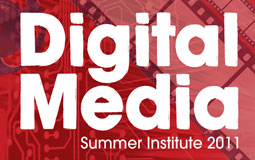 The fifth annual Summer Institute will offer students and professionals in Lisbon and Porto the opportunity to explore a variety of digital media topics ranging from experimental animation to entrepreneurial journalism.
The fifth annual Summer Institute will offer students and professionals in Lisbon and Porto the opportunity to explore a variety of digital media topics ranging from experimental animation to entrepreneurial journalism.
Renowned instructors from the University of Texas at Austin will teach six intensive short courses from one to three weeks in duration in May, June and July. The courses will be taught at the graduate level.
In addition, the Cinemateca Portuguesa will host public screenings of five films with commentary by Professor Tom Schatz of UT Austin.
Program - How to Apply - Course Descriptions - Instructors
Program at a Glance
See full course descriptions below.
Lisbon
Collaborative Database Documentary Workshop
Karen Kocher, UT Austin – 23 May to 10 June at FCSH/UNL.
Collaborative Screenwriting
Richard Lewis, UT Austin – 13 June to 1 July at FCSH/UNL.
Opening and cinema sessions with Tom Schatz at the Cinemateca Portuguesa
23 to 27 May – presenting: Star Wars [1977], The Simpsons Movie [2007], The Lord of The Rings: Fellowship of the Ring [2001], The Dark Knight [2008], Sex and the City [2008]. More information
Porto
Entrepreneurial Journalism for the Digital Age
Rosental Alves, UT Austin – 13 to 17 June at U.Porto.
Experimental Animation
Jeanne Stern – 27 June to 15 July at FEUP
Short Form Documentary Production
Nancy Schiesari, UT Austin – 4 to 15 July at Público
How to Apply
Applications are now closed.
Interested prospective applicants should send an email to carolina.enes@fct.unl.pt with the following information:
- The name of the course to which they are applying on the subject line of the email (one email per course);
- An application letter of up to 350 words and CV (both in English);
- Full name, address, telephone number, age and highest degree achieved. Students must also indicate the course and institution they are attending.
Fees per course are noted with the course descriptions below. Selected applicants will be instructed on how to enroll and pay their fees.
Course Descriptions
Collaborative Database Documentary Workshop
Karen Kocher, UT Austin
23 May to 10 June at FCSH/UNL, Lisbon
(10h00-13h00)
ECTS 3
Fee: 30€. Registration closed.
A database documentary is a documentary that may combine video, audio, still images and graphic elements into discrete narrative units, connecting them through the use of a graphic user interface. Examples of database documentaries can be found in Google maps, the Korsakow tool and many Flash-based projects.
After viewing and discussing sample productions, participants will work in small groups to conceive, produce and edit their own, small database documentaries using the city of Lisbon as a source of inspiration.
Prior experience with shooting and editing are helpful as this will be a technically intensive workshop. The course will use Final Cut Pro editing software.
All participants will be expected to come on time, participate in all 15 class sessions and contribute to the course blog. Please do not apply to this workshop if you have commitments that will cause you to miss any of the sessions.
The workshop will meet from 10 am to 1 pm. Shooting of the projects will be scheduled on the weekend between weeks one and two and outside of workshop time.
Collaborative Screenwriting
Richard Lewis, UT Austin
13 June to 1 July at FCSH/UNL, Lisbon
(14h00 – 17h00)
ECTS 3
Fee: 30€.
Collaborative Screenwriting will treat its members as a writing staff and, collectively we will begin writing multiple scripts over the course of the three week class. These scripts may be features, TV pilots, or whatever form interests the class. For the first two weeks, we will brainstorm the ideas together, and writers and/or writing teams will be assigned particular scenes to write.
During the first two weeks, the fact that you are not working entirely on your own material will enable you to look at writing from a completely different perspective. While screenwriting is an art, it is also a craft -- one that requires considerable collaboration with others (e.g., producers, directors, development executives, etc.) Additionally, in a collaborative environment, every page of every script being workshopped is equally yours, and good writing will have to be negotiated until we are satisfied, if not excited.
At the conclusion of week two, students will select a project to continue working on individually during week three. The student may select from the group projects that were created in class or may pitch an original idea. If the student elects to pursue an original idea, the student will be expected to use the same tools and techniques discussed in weeks one and two on his/her new work.
Entrepreneurial Journalism for the Digital Age
Rosental Alves, UT Austin
13 to 17 June at Course of Communication, U.Porto
(3h in the morning and 3h in the afternoon daily, preceded by preparatory work to be done online with Moodle)
ECTS 3,5
Fee: 30€ for students, 150€ for non-students. Application deadline Monday June 6.
This course will focus on the creation of for-profit or nonprofit innovative journalistic enterprises and initiatives for the emerging media ecosystem that has been formed by the Digital Revolution. The class will study the impact of the digital technologies on the news industry, both on the side of content production and consumption, with special attention to the changes on business and distribution models and on ways people consume (and produce) news and information. The historical evolution of the business of journalism will also be examined. Through case study methods, students will dissect successful and unsuccessful journalistic initiatives based on innovative uses of digital technologies. Later, the class will work on projects and prototypes that will include business plans, demos with real content creation, usability tests, etc. The course will be based on the fundamental elements of journalism, such as ethics and fairness, and its role in a democratic society, and how to transfer those values to the new media ecosystem in an effective and sustainable way.
Experimental Animation
Jeanne Stern
27 June to 15 July at FEUP room I004
(3 hours of lecture and 3 hours of open lab per day)
ECTS 6
Fee: 40€ for students, 150€ for non-students. Application deadline Monday June 6.
In this class students will learn about experimental animation practices and concepts with the aim of producing individual short animations. Students entering this class will be expected to have basic experience in either animation, visual arts, or film production. In this class animation will be approached as a fine art medium and students will be encouraged to push the boundaries of animation as well as to develop their own unique visual style.
The course will include discussions of theoretical concepts of motion as well as screenings of historical and contemporary experimental animation. Students will complete animation exercises using a variety of animation techniques such as cut-paper animation, stop-motion, drawings, stereoscopic, or others. Students will then use this experience to create short animated films using the method of their choice.
Short Form Documentary Production
Nancy Schiesari, UT Austin
4 to 15 July at Público offices in Porto
(3h in the morning and 3h in the afternoon daily)
ECTS 4
Reserved for employees of Público. Application deadline Monday June 6.
This course is aimed at increasing proficiency in documentary production concepts and skills. Students will utilize the camera as a tool of interaction and critical investigation with an emphasis on creating video stories for both linear and multi platform formats.
The class will be structured around one assignment per student and a number of practical exercises.
Specific instruction in technical areas of sound and image will be concentrated in the first three days of the class using exercises that facilitate mastering the building blocks of documentary production- writing a treatment, shooting a visual sequence, lighting and framing interviews, recording good quality sound, and editing.
In class we will deconstruct documentary films to analyze different ways meaning is communicated non-verbally using music, tone of voice, sound effects, still photography, graphics and animation.
Instructors
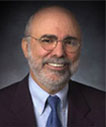 Rosental C. Alves is a Professor in the School of Journalism at UT Austin. He began his academic career in the United States in March 1996, after 27 years as a professional journalist, including seven years as a journalism professor in Brazil. For over a decade, he was a foreign correspondent based in Spain, Argentina, Mexico and the United States, working for Jornal do Brasil in Rio de Janeiro, one of the most important Brazilian newspapers. In 1994, he managed the creation of Jornal do Brasil online edition, making it the first Brazilian newspaper available on the Web. Professor Alves created the first course on online journalism at The University of Texas at Austin. He also teaches courses on international reporting and Latin American studies. A working journalist since he was 16, Alves received a B.A. in journalism from the Rio de Janeiro Federal University. He was the first Brazilian awarded a Nieman Fellowship to spend an academic year (1987-88) at Harvard University. He previously taught journalism at Fluminense Federal University and at Gama Filho University, in Rio de Janeiro, beginning as a lecturer when he was 21.
Rosental C. Alves is a Professor in the School of Journalism at UT Austin. He began his academic career in the United States in March 1996, after 27 years as a professional journalist, including seven years as a journalism professor in Brazil. For over a decade, he was a foreign correspondent based in Spain, Argentina, Mexico and the United States, working for Jornal do Brasil in Rio de Janeiro, one of the most important Brazilian newspapers. In 1994, he managed the creation of Jornal do Brasil online edition, making it the first Brazilian newspaper available on the Web. Professor Alves created the first course on online journalism at The University of Texas at Austin. He also teaches courses on international reporting and Latin American studies. A working journalist since he was 16, Alves received a B.A. in journalism from the Rio de Janeiro Federal University. He was the first Brazilian awarded a Nieman Fellowship to spend an academic year (1987-88) at Harvard University. He previously taught journalism at Fluminense Federal University and at Gama Filho University, in Rio de Janeiro, beginning as a lecturer when he was 21.
 Karen Kocher is an Austin-based media producer who works in film and video and multimedia. For the past 10 years, she has been creating media work for digital platforms and studying the ways that the digital technology is expanding the documentary genre. In 2004, she created the first course in interactive documentary within the Department of Radio-TV-Film. This course introduces students to the study and creation of disc and computer-based non-linear documentaries.
Karen Kocher is an Austin-based media producer who works in film and video and multimedia. For the past 10 years, she has been creating media work for digital platforms and studying the ways that the digital technology is expanding the documentary genre. In 2004, she created the first course in interactive documentary within the Department of Radio-TV-Film. This course introduces students to the study and creation of disc and computer-based non-linear documentaries.
Currently Ms. Kocher is developing Living Springs, a media-rich website about the culture, history and science of Barton Springs pool. The website will engage young adult and adult learners in an interactive exploration of Barton Springs in Austin, Texas to foster greater understanding of how the natural environment helps to define human culture.
Kocher has also worked on nationally broadcast PBS documentaries including the award-winning series Chicano!: a History of the Mexican American Civil Rights Movement, and Songs of the Homeland, a documentary about the history of Tex-Mex music.
Ms. Kocher has been teaching documentary production and digital post-production for the Department of Radio, Television and Film at the University of Texas at Austin since 1998.
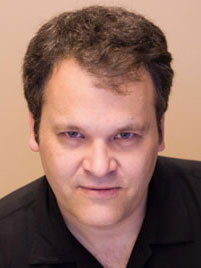 Richard Lewis has worked as an editor, producer, director, and/or writer for companies including National Geographic Television, Channel 4 (UK), A&E, PBS, Sierra Club Productions, and Devillier-Donegan Enterprises. Most recently, he worked on The Living Weapon, an episode of American Experience for PBS. His last production, Chimp Rescue, premiered on National Geographic Explorer and won a Genesis Award for Best Cable Documentary.
Richard Lewis has worked as an editor, producer, director, and/or writer for companies including National Geographic Television, Channel 4 (UK), A&E, PBS, Sierra Club Productions, and Devillier-Donegan Enterprises. Most recently, he worked on The Living Weapon, an episode of American Experience for PBS. His last production, Chimp Rescue, premiered on National Geographic Explorer and won a Genesis Award for Best Cable Documentary.
Richard's editing credits include Nick Broomfield's Aileen Wuornos: The Selling of A Serial Killer. Additional experience includes three years as a story analyst in Los Angeles and three years as a management consultant with Andersen Consulting in Atlanta and London.
Richard primarily teaches producing and screenwriting.
 Tom Schatz is the Mary Gibbs Jones Centennial Chair (and former chairman) of the Department of Radio-Television-Film at The University of Texas at Austin, where he has been on the faculty since 1976, and is currently the Executive Director of the University of Texas Film Institute. He has written four books about Hollywood films and filmmaking, including Hollywood Genres: Formulas, Filmmaking, and the Studio System; The Genius of the System: Hollywood Filmmaking in the Studio Era; and Boom and Bust: American Cinema in the 1940s. Schatz edited the four-volume collection, Hollywood: Critical Concepts, and he also serves as series editor of the Film and Media Studies Series for the University of Texas Press.
Tom Schatz is the Mary Gibbs Jones Centennial Chair (and former chairman) of the Department of Radio-Television-Film at The University of Texas at Austin, where he has been on the faculty since 1976, and is currently the Executive Director of the University of Texas Film Institute. He has written four books about Hollywood films and filmmaking, including Hollywood Genres: Formulas, Filmmaking, and the Studio System; The Genius of the System: Hollywood Filmmaking in the Studio Era; and Boom and Bust: American Cinema in the 1940s. Schatz edited the four-volume collection, Hollywood: Critical Concepts, and he also serves as series editor of the Film and Media Studies Series for the University of Texas Press.
Schatz's recent publications include an essay on "Band of Brothers" in The Essential HBO Reader (2008) and "The Studio System and Conglomerate Hollywood," the lead essay in The Contemporary Hollywood Film Industry (2008). Current publishing projects include a study of contemporary Hollywood and a revised edition of Hollywood Genres.
As Executive Director of the UT Film Institute, which he founded and launched in 2003, Schatz oversees a program devoted to training students in narrative and digital filmmaking, and the actual production of feature-length independent films.
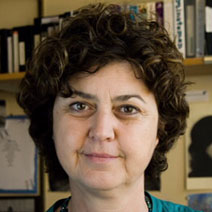 Nancy Schiesari trained as a painter and cinematographer in England and is a graduate of the Royal College of Art in London. She is a Director and Producer on both broadcast documentaries and award winning children’s videos. Her latest full-length documentary Hansel Mieth: Vagabond Photographer (see below) aired on PBS Independent Lens, the Australian Broadcast Corporation, and is currently airing on TVOntario. Her award winning children’s video, Mr. Zamboni, won the Silver Apple at the National Education Media Awards in 1999. Nancy also has more than twenty years experience as a Director of Photography on over 30 documentaries and feature films broadcast for England’s Channel 4, BBC in London, ABC, National Geographic, and PBS. Nancy has filmed in Europe, the U.S., Africa, India, Pakistan, Iceland, and Latin America. Nancy is in post production on Behind the Lines: the OSS and the Italian Resistance in WWII and recently completed Tattooed Under Fire with funding and support from LINCS, ITVS, and local PBS station KLRU. She teaches Filmmaking and Cinematography at the University of Texas at Austin where she has been a Professor for twelve years.
Nancy Schiesari trained as a painter and cinematographer in England and is a graduate of the Royal College of Art in London. She is a Director and Producer on both broadcast documentaries and award winning children’s videos. Her latest full-length documentary Hansel Mieth: Vagabond Photographer (see below) aired on PBS Independent Lens, the Australian Broadcast Corporation, and is currently airing on TVOntario. Her award winning children’s video, Mr. Zamboni, won the Silver Apple at the National Education Media Awards in 1999. Nancy also has more than twenty years experience as a Director of Photography on over 30 documentaries and feature films broadcast for England’s Channel 4, BBC in London, ABC, National Geographic, and PBS. Nancy has filmed in Europe, the U.S., Africa, India, Pakistan, Iceland, and Latin America. Nancy is in post production on Behind the Lines: the OSS and the Italian Resistance in WWII and recently completed Tattooed Under Fire with funding and support from LINCS, ITVS, and local PBS station KLRU. She teaches Filmmaking and Cinematography at the University of Texas at Austin where she has been a Professor for twelve years.
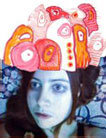 Jeanne Stern creates surreal microcosms using animation and experimental puppetry techniques. Her work deals with themes of memory, duality, spatial illusion, gender, and play. It has shown in a variety of festivals and galleries including the Smithsonian, South by Southwest, PBS, San Diego Women’s Film Festival, “Y Que” at Landmark Arts, Orlando Museum of Art, and is currently on tour with Heather Henson’s traveling festival Handmade Puppet Dreams.
Jeanne Stern creates surreal microcosms using animation and experimental puppetry techniques. Her work deals with themes of memory, duality, spatial illusion, gender, and play. It has shown in a variety of festivals and galleries including the Smithsonian, South by Southwest, PBS, San Diego Women’s Film Festival, “Y Que” at Landmark Arts, Orlando Museum of Art, and is currently on tour with Heather Henson’s traveling festival Handmade Puppet Dreams.
Jeanne received her MFA in Film production from the University of Texas at Austin, and her BA in Studio Art from Connecticut College. In 2008 she completed a residency and new media commission for the Connecticut College Arts & Technology Symposium, and in 2009 she was an artist-in-resident at the Elsewhere Elsewhere Artist Collective. She currently lives in Austin where she works as an animator and artist.

 News
News
